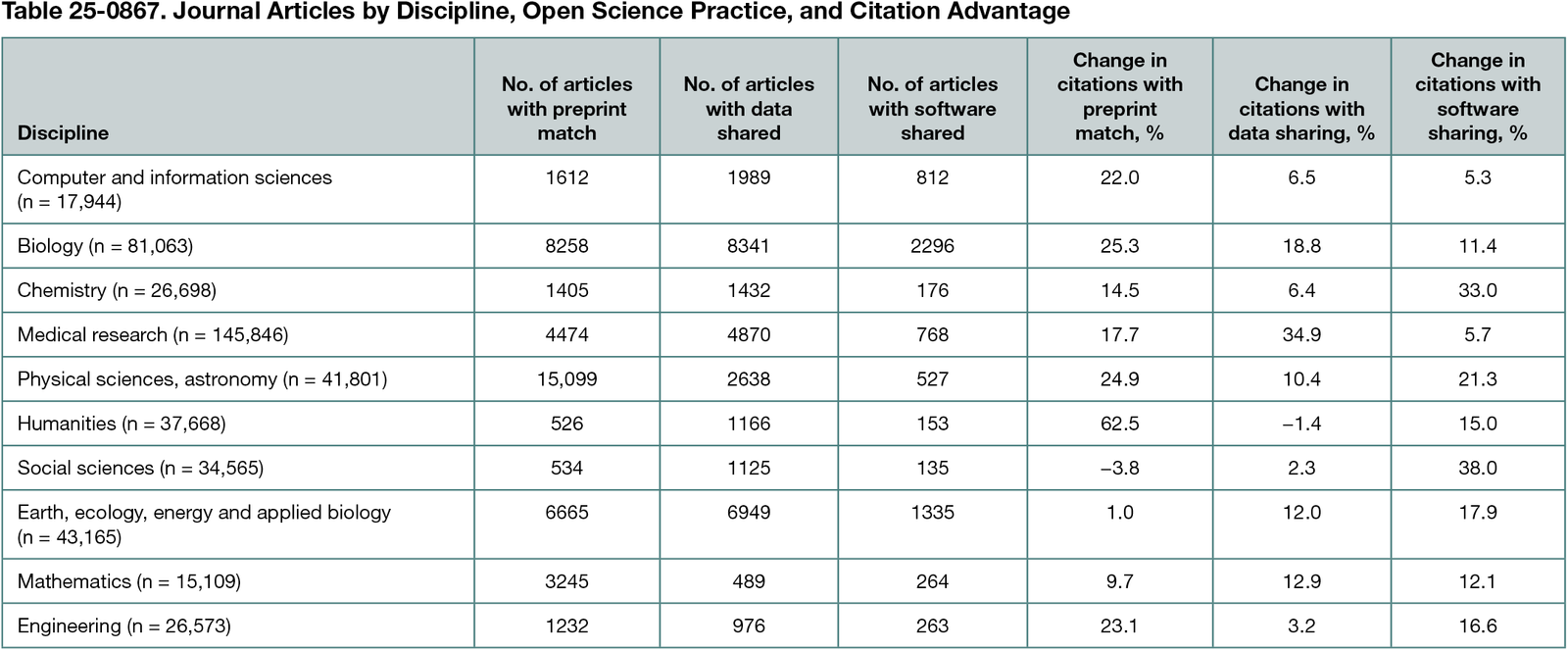Citations of Articles With Open Science Indicators in the French Open Science Monitor Dataset
Abstract
Giovanni Colavizza,1,2 Lauren Cadwallader,3 Iain Hrynaszkiewicz3
Objective
This research explored whether articles that demonstrate 1 or more open science practices received more citations on average than similar articles that do not demonstrate open science practices by applying an existing linear regression model1 to an openly available dataset.
Design
This study applied a previously published citation prediction model1 with data from openly available sources including OpenAlex, DataCite, CrossRef, and the French Open Science Monitor dataset,2 which includes all research publications from open data sources with at least 1 French author. This study evaluated whether open science practices in publications are associated with changes in citation impact. A total of 479,700 journal articles were analyzed, which were from across 10 broad categories of research domains, have at least 1 French author, were published in 2020-2022, and for which the metadata, including citation counts, could be extracted from the publicly available sources at the time of this study (July 2024). The citation prediction method controlled for factors known to influence citations such as article age, open access status, research discipline, length of reference lists, and numbers of authors. Associations were assessed with an ordinary least squares model.
Results
The analysis showed that a citation advantage was associated with all 3 open science practices (data, code, and preprint sharing), both individually and cumulatively. Posting a preprint had the largest association with citations and was correlated with a 19.0% higher number of citations, compared with articles that did not have preprints. The associations with sharing research data and code were smaller—and correlated with 14.3% and 13.5% higher number of citations, respectively. These advantages were cumulative, that is, articles with a preprint, shared research data, and shared code attracted a mean of 46.8% more citations than articles that do not share these outputs. Variation in citation advantage was seen across disciplines (Table 25-0867). For example, articles that had preprint postings had a 1.0% higher number of citations in the fields of earth, ecology, energy and 62.5% more citations in the humanities, compared with articles in the same disciplines that did not have preprints. Study limitations include the dataset bias toward French publications (we might observe different citation correlations in a more international sample), and the results for the data and code sharing citation advantage were not directly comparable with the results in previous studies due to differences in the definition and calculation of open science practices.

Conclusion
This study explored the French Open Science Monitor dataset and investigated whether open science indicators were associated with a citation premium received by the publications that follow them. To our knowledge, this is the largest scale analysis of such a question to date using nearly 500,000 publications from many scientific domains, which found a positive association between the open science practices of data, code, and preprint sharing and postpublication citation counts.
References
1. Colavizza G, Cadwallader L, LaFlamme M, et al. An analysis of the effects of sharing research data, code, and preprints on citations. PLOS One. 2024;19(10): e0311493. doi:10.1371/journal.pone.0311493
2. Ministère de l’Enseignement supérieur, de la Recherche et de l’Innovation. Baromètre de la science ouverte (général). Accessed July 15, 2024. https://data.enseignementsup-recherche.gouv.fr/explore/dataset/open-access-monitor-france/information
1University of Bologna, Bologna, Italy; 2University of Copenhagen, Copenhagen, Denmark; 3PLOS, Cambridge, UK, lcadwallader@plos.org.
Conflict of Interest Disclosures
PLOS works to promote adoption of open science practices and provided funding for this study for the collection, management, analysis, and interpretation of the data by Giovanni Colavizza. PLOS also provided support in the form of salaries for authors Lauren Cadwallader and Iain Hrynaszkiewicz. PLOS also had a role in the design and conduct of the study; collection, management, analysis, and interpretation of the data; preparation, review, and approval of the abstract; and decision to submit the abstract for presentation.
Additional Information
Data and code necessary to reproduce the results are available: https://doi.org/10.6084/m9.figshare.27822663
